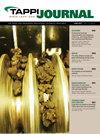Using bleaching stage models for benchmarking hardwood ECF bleach plants
IF 0.6
4区 农林科学
Q4 MATERIALS SCIENCE, PAPER & WOOD
引用次数: 0
Abstract
Steady-state models estimated the performance of the D0(EOP)D1 bleach sequence at two mixed hardwood bleach plants in the southern United States. At Mill 1, the full sequence’s chlorine dioxide charge that brightens the pulp to ~84% ISO was monitored for two weeks. Mill 2 considered the partial sequence that brightens the pulp to ~86% ISO for nearly four weeks. Elevated levels of chlorine dioxide were linked to increased washer carryover in brownstock and extraction areas. For Mills 1 and 2, an extra 0.24% and 0.33% chlorine dioxide was con- sumed in the D0 stage. This extra bleach demand was equivalent to an additional 4.8 and 5.5 kappa load to the brownstock, respectively. Some differences were observed for the D1 stage. Mill 1 had extraction carryover that averaged 1.1 units higher than was measured, contributing to use of an extra 0.22% of chlorine dioxide. Mill 2 had extraction carryover that averaged between 0 and 0.7 kappa units and consumed up to 0.13% more chlorine dioxide. Another data set from Mill 2 showed high brownstock and extraction carryover, leading to ~0.90% more total chlorine dioxide usage to brighten to 84% ISO. Overall, this investigation illustrated that the models could be employed as benchmarks.使用漂白阶段模型对硬木ECF漂白厂进行基准测试
稳态模型估计了美国南部两个混合硬木漂白剂厂的D0(EOP)D1漂白剂序列的性能。在1号厂,对整个序列的二氧化氯电荷进行了两周的监测,二氧化氯电荷使纸浆的亮度达到~84% ISO。2号厂考虑了将纸浆漂白至ISO约86%的部分顺序,耗时近四周。二氧化氯水平的升高与棕色原料和开采地区洗衣机残留量的增加有关。1号厂和2号厂在D0阶段额外消耗了0.24%和0.33%的二氧化氯。这一额外的漂白剂需求相当于棕色原料的额外4.8和5.5卡帕负荷。在D1期观察到一些差异。1号工厂的萃取量平均比测量值高1.1个单位,导致二氧化氯的额外使用0.22%。Mill 2的萃取量平均在0到0.7 kappa单位之间,消耗的二氧化氯多0.13%。来自2号工厂的另一组数据显示,高浓度的褐土和萃取物残留,导致二氧化氯的总使用量增加约0.90%,使ISO亮度达到84%。总的来说,本研究表明,这些模型可以作为基准。
本文章由计算机程序翻译,如有差异,请以英文原文为准。
求助全文
约1分钟内获得全文
求助全文
来源期刊

Tappi Journal
工程技术-材料科学:纸与木材
CiteScore
1.30
自引率
16.70%
发文量
59
审稿时长
6-12 weeks
期刊介绍:
An internationally recognized technical publication for over 60 years, TAPPI Journal (TJ) publishes the latest and most relevant research on the forest products and related industries. A stringent peer-review process and distinguished editorial board of academic and industry experts set TAPPI Journal apart as a reliable source for impactful basic and applied research and technical reviews.
Available at no charge to TAPPI members, each issue of TAPPI Journal features research in pulp, paper, packaging, tissue, nonwovens, converting, bioenergy, nanotechnology or other innovative cellulosic-based products and technologies. Publishing in TAPPI Journal delivers your research to a global audience of colleagues, peers and employers.
 求助内容:
求助内容: 应助结果提醒方式:
应助结果提醒方式:


